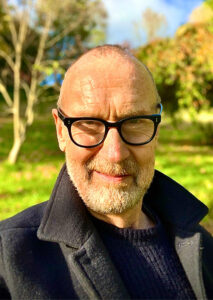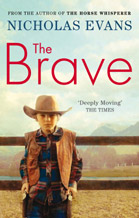The following are some of the questions that Nicholas Evans is most frequently asked, along with his replies.
Q. You write like an American and yet I hear you’re British. Is that true?
A: It is. I was born and brought up in Worcestershire, England. But I have always had a love affair with America, especially the American West. As a boy, all I really ever did was play Cowboys and Indians. I was always the Indian and various unfortunate friends and my dear sister Sue used to get chased and shot at and tied to trees (amazingly, Sue still speaks to me). I was an addict for Westerns, whether it was books, movies or those corny old TV shows, whose theme tunes I can still hum. It wasn’t until I was almost twenty that I finally got to visit the West and, of course, I discovered that most of those TV shows had been shot on the backlot of some Hollywood studio. The real thing, the real country was so much bigger and more beautiful.
Over a number of years I worked a lot in the U.S., for example, covering the 1976 presidential campaign for a UK TV current affairs show. It was then that I got to discover that America wasn’t just LA and New York and Miami, but a hundred different cities and towns in between. When I had the idea for The Horse Whisperer, I saw it from the outset as an American story and one that needed to be told in an American, not an English, voice. I had written a lot of screenplays but this was the first time I had tried to write a book. People talk about the ‘voice’ of a writer. Well, if I have one that was how it was born — and why it doesn’t sound like the one that comes out of my mouth.
Q: How did you get the idea for The Horse Whisperer?
A: Before I wrote it, I was a (not hugely successful) writer and producer of films. For some time, because I have always been an addict of Westerns, I’d been thinking of one day writing a story set in the contemporary American West. Not a Western exactly, but a story that would be set in that amazing landscape; a love story maybe.
Around that time I was staying with a friend in Devon, in the southwest of England, and at supper one evening I heard another friend of his (a veterinarian farrier, called Robbie Richardson) telling someone he had once seen a ‘horse whisperer’ at work. I had been around horses since I was a young boy, but until that moment had never heard that term. Robbie told me how this traveling horseman had transformed a traumatized pony back to the loving, sweet-natured creature it had once been.
For some reason the story touched me deeply. I started to research horse whispering and discovered its history goes back many centuries. Probably for as long as man and horses have known each other, there have always been people who seemed to know what was going on inside a horse’s head. Sometimes they were seen as witches and some were even burned at the stake because when a horse went berserk, it was thought the devil was in him and, by extension, anyone who could expel the devil must, it was thought, have some kind of magic power.
Suddenly I realized I had the central character for my Western story and piece by piece the rest of it fell into place. I spent many weeks traveling across the West and met three amazing horsemen: Tom Dorrance, Ray Hunt and Buck Brannaman. Some of you may have read that someone called Monty Roberts was the model for Tom Booker, The Horse Whisperer in the book, and that he helped me with my research. It’s not true. met Mr Roberts once, briefly, in England but have never seen him with a horse or seen him since. He had no involvement whatsoever.
Had my movie career been more successful, I might have tried writing the story as a screenplay. Luckily, I was on my uppers, deeply disillusioned with the movie business, and didn’t see the point of writing another script to gather dust on my desk. Instead, insanely, I thought I’d try writing it as a novel.
Q: Did you like the movie of The Horse Whisperer?
A: For readers and writers alike, it’s always hard to eliminate the pictures that you have created in your own head and to be open-minded about a film-maker’s vision of the same story. I used to write screenplays and have adapted books for the screen, sometimes making substantial changes, so I know the process. When you are writing a book you can enter into the characters and let the reader know what’s going on in their heads and hearts. With movies, you are much more restricted; you have to tell the story through action, characters have to define themselves by what they do (unless, of course, it’s a Woody Allen film, in which case they can tell each other all the time how they are feeling).
In the book of The Horse Whisperer I tell the story through the point of view of the main characters, so translating that to the screen was always going to be difficult. And to be honest, although I think Robert Redford did a marvelous job with the horse work and the whole look of the picture (and the acting, of course, was fabulous), I don’t think the second half of the movie really worked. It kind of got itself lost. I don’t think they ever really had the script right before they started shooting and once you’ve started there is never enough time to fix it. The ending, in my opinion, completely missed the point of the book.
Q: Which was what?
A: Well, although Tom Booker is, in every respect, a real character, there is an important mythological aspect to him and to the story. He is, if you like, an immortal, the redemptive angel, the man in the white hat. There is a rule about such characters: when their work is done, they have to move on. They cannot hang around and ‘mix it’ with the mortals. For Annie and Grace to be free to get on with their lives, for the healing process to be properly complete, the healer-angel figure has to move on. Of course, he will live on forever in their hearts — and in the new child that is born at the end of the story.
These mystical things, metaphor and myth, are so much harder to do in movies than in books. Movies are so very literal. In the book, the ending is full of hope. In the movie, it is dismal and depressing. Annie will forever be a prisoner of her love for Tom. There is no ‘moving on,’ no release or closure. Having said all this, I count myself very fortunate that someone of Redford’s enormous talent and stature wanted to make the film. I simply wonder if, as star, director and producer, he sometimes had a little too much on his plate.
Q : Animals figure prominently in your books. Why is that?
A: Sometimes I hear people who haven’t read my books describing me as ‘the animal writer.’ It makes my heart sink. I don’t see myself that way at all. I don’t consider either The Horse Whisperer or The Loop to be ‘animal stories.’ The animals in them (horses and wolves) were, in a sense, metaphorical. The animal I do write about, is the human animal. In particular, I am always fascinated in family dynamics — the relationships between men and women and their children and the pain we inflict on those we love the most. That said, I have always loved animals and found it easy to get along with them. I truly believe that one of our problems as a species is that we have lost our animal nature and have come to think we are superior to all other species. We have stepped out of the circle of life and have come to believe that our highly developed rational/intellectual sense is the only one that matters. In so doing, we have lost use of our other senses (our common sense, especially), so that we are now unable to live naturally on the planet and what is more seem bent on destroying it.
Q: Who are your favorite novelists?
A: That’s a difficult question. Among the classics, they would have to include Dickens, Tolstoy, Balzac, Kipling and Jack London. Among the more contemporary: Graham Greene and Ernest Hemingway. Among the living: Cormac McCarthy, Jane Smiley, John Updike and Philip Roth, Pat Conroy and Elmore Leonard.
Q: I want to be a novelist. What advice would you give me?
A: Read, read, and read. Then, when you think you’ve read enough and might know how to do it, find a story that moves you and tell it from the heart. Try not to copy anyone’s style and don’t think about the reader, just write for yourself. Be your characters, inhabit their heads; never bend the characters to fit the story; write what is true to them. And remember this: any attempt to find the formula of what makes a bestseller is doomed to failure. There is no such thing as a formula. But if what you write moves and excited you, there is a chance it may move and excite others too.
Q: Do you always know the start, middle and end of your story before you begin writing?
A: Yes. But things evolve and change. I do my research and during that time the outline of the story takes shape in my head. Starting to write is a bit like going for a hike in a place you have never before visited with people you know little about. Before you set out, you study the map and then you drive there, put on your boots and your backpack of research and set off up the trail.
At first, the characters you are hiking with will be like silhouettes; maybe you know just one or two key things about them. Once you start walking, you have to ask yourself all kinds of questions about them. Where was she born? What was his relationship like with his father? Did she go to college? Can she catch a ball, sail, speak French? Who was his first love? As you answer these questions, so the silhouettes begin to fill in and after a few miles you are getting to know who they are.
And when you see the terrain you are hiking through, you will maybe change your mind about the route you had planned to take. You are headed in the same direction, but instead of walking up in the trees, you decide to go lower along the river or maybe you’ll spend an extra day camped by the waterfall. The characters will sometimes tell you to do this kind of thing too.


